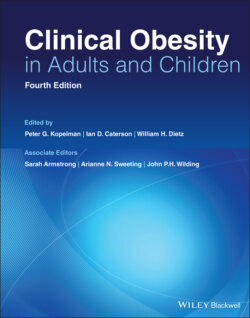Читать книгу Clinical Obesity in Adults and Children - Группа авторов - Страница 81
Response to leptin therapy
ОглавлениеIn 2002 we reported the dramatic and beneficial effects of daily subcutaneous injections of leptin in reducing body weight and fat mass in three congenitally leptin‐deficient children [30]. All children showed a response to initial leptin doses designed to produce plasma leptin levels at only 10% of those predicted by height and weight (i.e. ∼0.01 mg/kg of lean body mass). The most dramatic example of leptin’s effects was with a 3‐year‐old boy, severely disabled by gross obesity (wt 42 kg), who now weighs 32 kg (75th centile for weight) after 48 months of leptin therapy (Fig. 4.1) [30].
The major effect of leptin was on appetite, with normalization of hyperphagia. Leptin therapy reduced energy intake during an 18 MJ ad libitum test meal by up to 84% (Fig. 4.2a). We were unable to demonstrate a major effect of leptin on basal metabolic rate or free‐living energy expenditure (Fig. 4.2b) but, as weight loss by other means is associated with a decrease in basal metabolic rate (BMR) [35], the fact that energy expenditure did not fall in our leptin‐deficient subjects is notable.
The administration of leptin permitted progression of appropriately timed pubertal development in the single child of appropriate age and did not cause the early onset of puberty in the younger children (Fig. 4.3) [30]. Free thyroxine and thyroid‐stimulating hormone (TSH) levels, although in the normal range before treatment, had consistently increased at the earliest post‐treatment time point and subsequently stabilized at this elevated level [30]. These findings are consistent with evidence from animal models that leptin influences thyrotropin‐releasing hormone (TRH) released from the hypothalamus [36] and from studies illustrating the effect of leptin deficiency on TSH pulsatility in humans [37].
Throughout the trial of leptin administration, weight loss continued in all subjects, albeit with refractory periods, which were overcome by increases in leptin dose. The families in the United Kingdom harbor a mutation that leads to a prematurely truncated form of leptin, and thus wild‐type leptin is a novel antigen to them. Thus, all subjects developed anti‐leptin antibodies after ∼6 weeks of leptin therapy, which interfered with an interpretation of serum leptin levels and, in some cases, were capable of neutralizing leptin in a bio‐assay. These antibodies are the likely cause of refractory periods occurring during therapy. The fluctuating nature of the antibodies probably reflects the complicating factor that leptin deficiency is itself an immunodeficient state and administration of leptin lead to a change from the secretion of predominantly Th2 to Th1 cytokines, which may directly influence antibody production. Thus far, we have been able to regain control of weight loss by increasing the dose of leptin.
